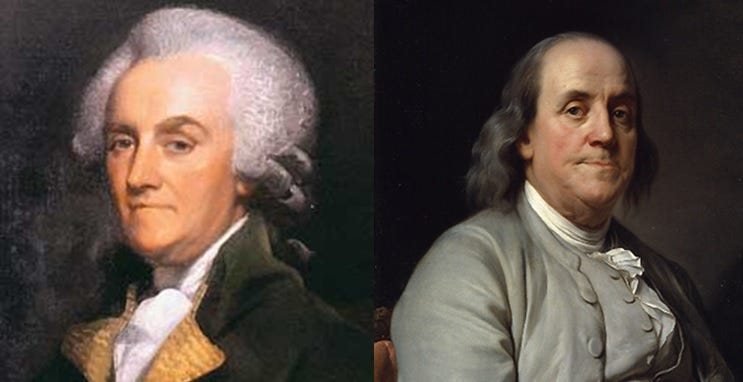TDIH: Benjamin Franklin's son, imprisoned
New Jersey's Provincial Congress ordered William’s arrest, declaring him an “enemy to the liberties of this country.”
On this day in 1776, the Provincial Congress of New Jersey declares William Franklin, the son of Benjamin Franklin and the last royal governor of New Jersey, to be “a virulent enemy to this country, and a person that may prove dangerous.”
It asked the Continental Congress to imprison him.
William was the son of a living legend, which couldn’t have been easy. He was also the illegitimate son of an unidentified woman during an era when that was viewed unfavorably. Presumably, the situation caused him a fair amount of inner conflict?!
Franklin did his best to help his son anyway. For instance, in the early 1760s, he helped secure his son an appointment as New Jersey’s royal governor.
William was a popular governor. At first, he was sympathetic to colonial concerns with British oppression, but he ultimately could not take matters as far as his fellow countrymen. He thought that British taxes had to be tolerated, even if they were unfair. Over time, his popularity began to wane accordingly.
After Lexington and Concord, William became involved in covert operations to undermine the revolutionary cause. In January 1776, a letter was intercepted, confirming that he was passing on intelligence to the British. William was briefly arrested, but then he was released.
Unfortunately, William couldn’t let sleeping dogs lie.
In May 1776, William decided to make another attempt. Using his title as royal governor, he ordered the General Assembly to convene. One small problem: This order stood in stark contrast to the existence of the (colonial) Provincial Congress then meeting in the state. Perhaps unsurprisingly, the Provincial Congress ordered William’s arrest, declaring him an “enemy to the liberties of this country.” It then asked the Continental Congress to confine William. On June 24, Congress agreed, ordering that “William Franklin be sent under guard to [Connecticut] Governor Trumbull.”
William was initially paroled in the town of Wallingford and treated rather generously at first. The area was very pro-Patriot, however, and he feared retaliation.
He probably deserved the Patriots’ suspicion. It turned out that William was *still* helping the Loyalist cause through the power of his pen and paper. He was caught during the spring of 1777.
On April 22, 1777, the Congress took further action. William was sent “into close confinement, prohibiting to him the use of pen, ink, and paper, or the access of any person or persons, but such as are properly licensed for that purpose by Governor Trumbull.” This time, William was locked up in a jail. He sat in that jail cell in July 1777, when his wife died, it was said, of a broken heart.
William was eventually released in a prisoner exchange, but he remained undeterred and continued to work against the American cause.
After all this, perhaps you won’t be surprised to hear that William ended life as an exile, having never reconciled with his father, Benjamin Franklin.
One of our most famous Founders was estranged from his son during the Revolution? So many unexpected—and half forgotten—sacrifices were made that we might have liberty, weren’t they?
Sources can always be found on my website, here.





This was no doubt a regrettable and anguishing circumstance for Benjamin Franklin. Given the past 2 years of our country's divisiveness we have seen families and friends torn apart because of differing views on National issues including freedom and liberty. A consequence of poor leadership and personal choice. But there are some hills worth dying on.
This sure is a sad one. New to me. Can imagine Benjamin's anguish. Thanks Tara.